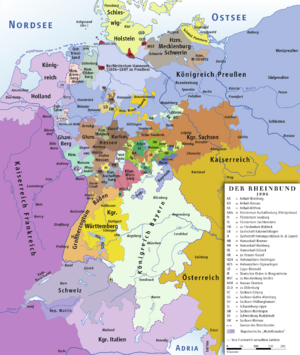Treaty of Schönbrunn (1805) facts for kids
The Treaty of Schönbrunn was an agreement signed between France and Prussia. It was signed at Schönbrunn Palace in Vienna on December 15, 1805. This happened during the Napoleonic Wars, a time of big conflicts in Europe.
The treaty was meant to be a friendship agreement. Géraud Duroc signed for France, and Christian Graf von Haugwitz signed for Prussia. This agreement was later replaced by the Treaty of Paris on February 15, 1806, which kept most of its ideas.
Why Was This Treaty Signed?
Before this treaty, Prussia had signed another agreement called the Treaty of Potsdam with Russia on November 3. This meant Prussia would join a group called the Third Coalition against France if Napoleon Bonaparte didn't agree to peace.
French soldiers had already marched through Prussian land in September. Because of this, Prussia had taken control of the Electorate of Hanover. Hanover belonged to King George III of Great Britain, but the French had occupied it before.
However, Napoleon won a huge battle called the battle of Austerlitz on December 2. This victory broke up the Third Coalition. So, the Treaty of Potsdam no longer mattered. Prussia's representative, Haugwitz, then went to Vienna to make a friendship treaty with France instead.
What Did the Treaty Say?
The Treaty of Schönbrunn allowed Prussia to take over Hanover. But in return, Prussia had to give up some of its own lands. These lands included Ansbach, the Duchy of Cleves, and the Principality of Neuchâtel.
- Ansbach went to Bavaria.
- Bavaria then had to give up the Duchy of Berg to France.
- Berg and Cleves were then joined together to form the Grand Duchy of Berg and Cleves. This new area was given to General Joachim Murat.
- Neuchâtel was given by Napoleon to Marshal Louis-Alexandre Berthier.
Prussia also agreed to accept the rules of the Treaty of Pressburg. This was another important agreement between France and the Holy Roman Empire, which was signed later on December 26.
What Happened After the Treaty?
This treaty was seen as a very important event, along with the Battle of Austerlitz and the Treaty of Pressburg. People at the time felt it marked the end of an era. Napoleon showed he was not interested in keeping the Holy Roman Empire the way it used to be.
Taking over Hanover made Britain very angry. A British politician named Charles James Fox said Prussia's actions were "contemptible" and "greedy." This takeover eventually led to a war between Britain and Prussia.


